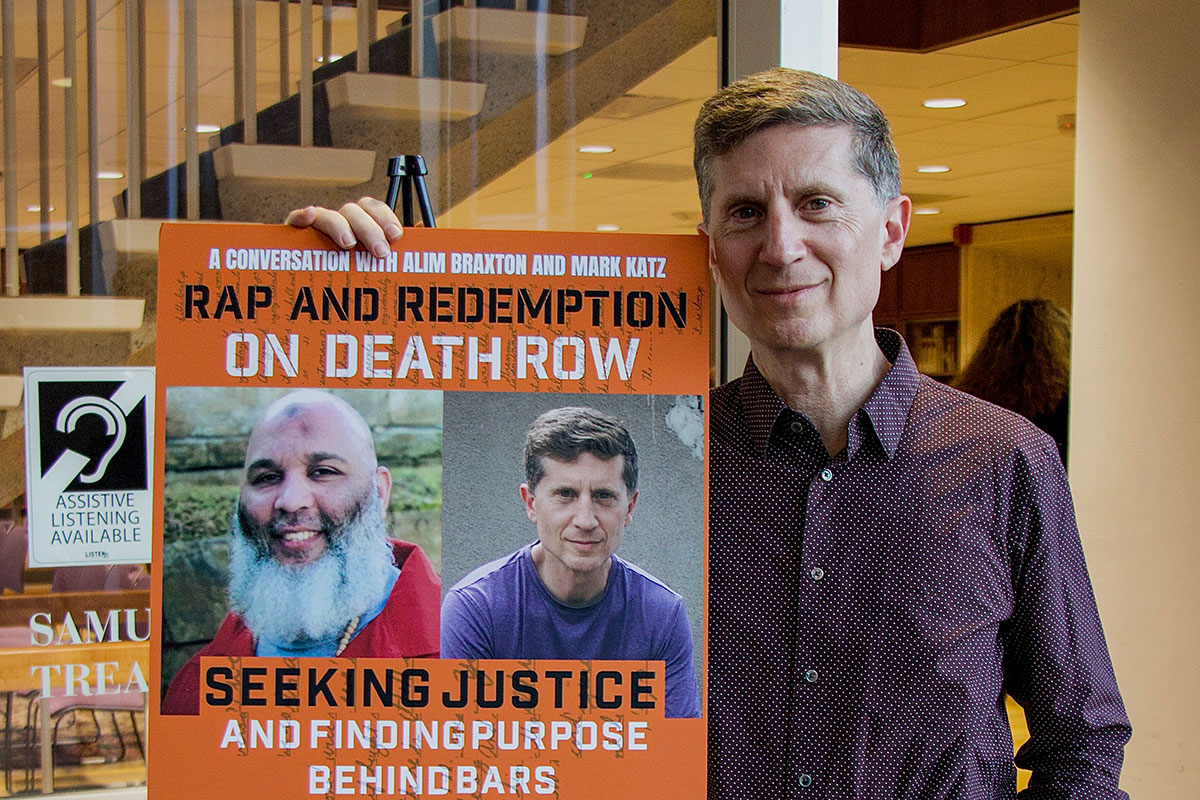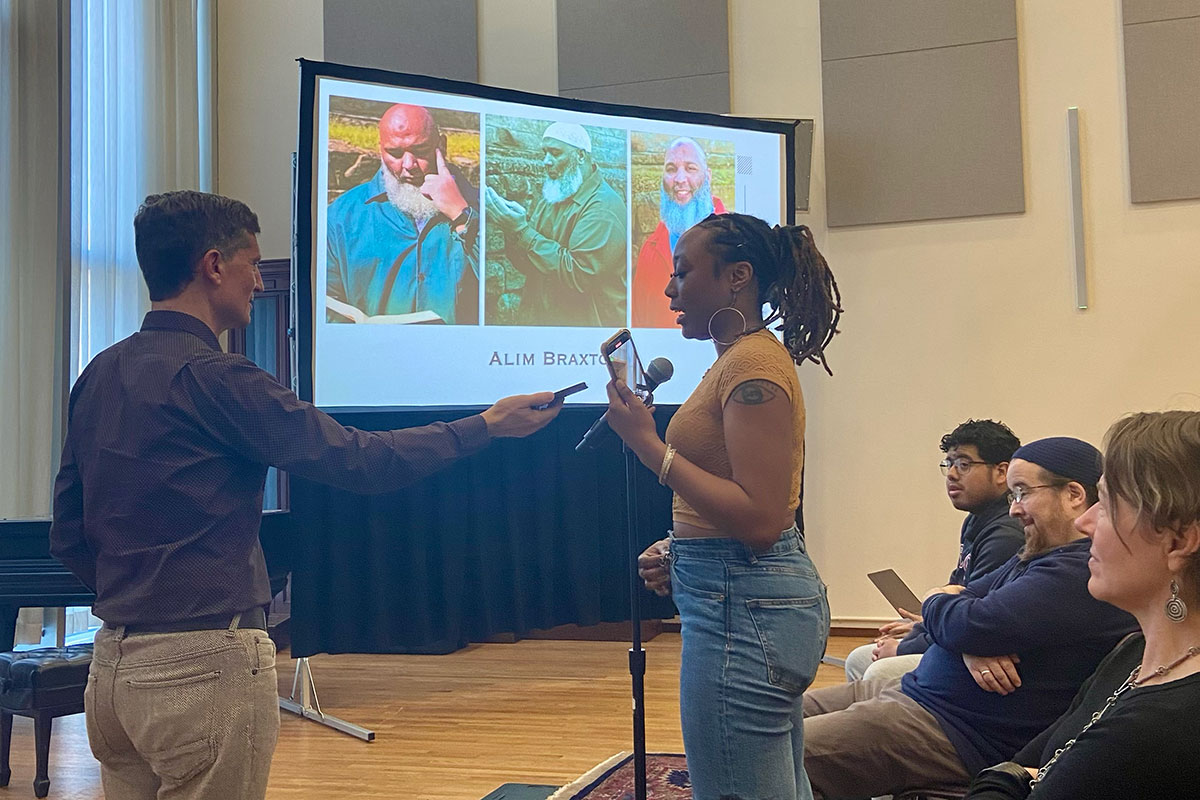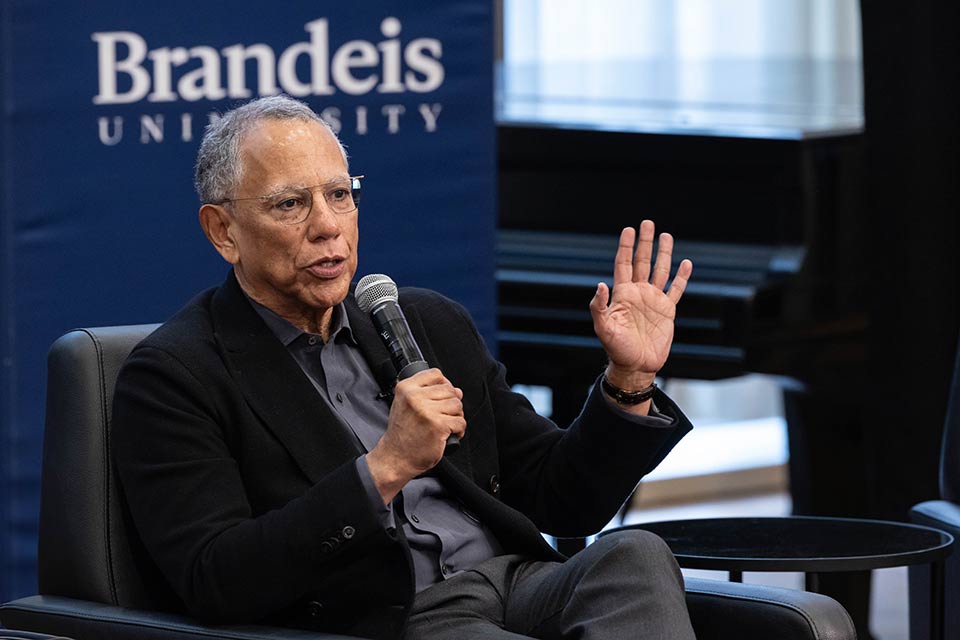Alim Braxton: Life lessons shared from death row
Finding purpose through hip hop from behind bars

By Carolyn Assa
March 17, 2025
Alim Braxton, aka Michael Jerome Braxton, has a lot to say about life, death, and finding purpose. His message is urgent because he is not sure how much time he has. Braxton is a prisoner on death row and has been for the better part of his life. Convicted of two counts of first-degree murder, three counts of robbery with a dangerous weapon and one count of first-degree kidnapping, he has been behind bars since he was 19 years old. In prison he found Islam, and he has been using rap to tell the world about what he describes as “the crisis of capital punishment.”
A crowd of nearly 100 students, faculty, staff, and guests filled Rapaporte Treasure Hall on Brandeis University’s Waltham campus on a balmy day in March for a singular opportunity to hear from, and ask questions of, Braxton himself. The forum-style presentation was part of DEIS Impact 2025 (a social justice festival in which multiple campus partners come together to educate the Brandeis community on social justice issues) and Civic Learning Week. At the start, guest moderator Mark Katz, John P. Barker Distinguished Professor of Music, Founding Director, Next Level Cultural Diplomacy Program, University of North Carolina Chapel Hill, set the stage for communicating with Braxton in an audio only call in which a recording would interrupt at regular intervals to remind the audience that they were speaking with an inmate at the state penitentiary in Raleigh, NC.

Brandeis has developed an international reputation for its involvement in a wide range of social justice initiatives across its portfolio of educational programs including hosting guest speakers like this one. Through its Community Engaged Scholars Program (CESP), Brandeis students are encouraged to be engaged citizens. Open to students in any major, the CESP builds connections between the curriculum and co-curriculum, creates a cohort of undergraduates committed to community service and civic engagement, and enables them to benefit from community-connected teaching, learning, and research.
“Events like this reflect Brandeis' commitment to meaningful, interdisciplinary, and community-engaged discussion,” said Megan Moran, Associate Director, COMPACT and Program Advisor, CESP, whose office was a co-sponsor of this event. “Of all my experiences in higher ed and hip hop, this event was the most profound. It was an honor to organize and host this program with Rosalind Kabrhel alongside so many outstanding campus and community partners.”
According to the Legal Defense Fund (LDF), 27 states, the federal government, and the U.S. Military have the authority to invoke the death penalty. On their website, the LDF states that at least 1,582 inmates were executed in the U.S. between the 1976 reinstatement of the death penalty and January 2024. Currently, the Death Penalty Information Center estimates that there are about 2,250 inmates on death row.
“This experience furthers one of my primary goals as director of the Brandeis Educational Justice Initiative (BEJI) — putting the voices of incarcerated people at the forefront of discussions about prison reform. It is wonderful to be part of a community at Brandeis that supports this goal, and I am grateful to the Samuels Center and particularly Megan Moran for making this event a reality,” said Rosalind Kabrhel, Associate Professor of the Practice of Legal Studies, and co-founder of BEJI which develops educational programs for incarceration impacted people, whose office was a co-sponsor of this event. You can learn more about BEJI's work by visiting the BEJI website, which includes a collection of resources.
Braxton would be the first to say he has not always done the right thing. He does not make excuses for his past deeds, and he does not dwell on them. He says the Qur’an teaches that “to save one life is like saving the world.” This has helped him find purpose – something that was unimaginable when he was first incarcerated. His goal now? To bring attention to the injustice of wrongful convictions in an aim to save one life, thus fulfilling his purpose, and in doing so redeem himself in some small way.
“Working with Alim Braxton has been life-changing for me. My appreciation of the power of music, of the possibilities of redemption and self-actualization, and of the humanity of incarcerated people has deepened tremendously over the five years I have known him,” said Katz. “Our conversation with the Brandeis community—which touched on all of these subjects—was rich and rewarding and an experience I will not forget.”
“My appreciation of the power of music, of the possibilities of redemption and self-actualization, and of the humanity of incarcerated people has deepened tremendously over the five years I have known [Braxton].”
Mark Katz
Katz and Braxton co-authored the 2024 book “Rap and Redemption: Seeking Justice and Finding Purpose Behind Bars,” which addresses questions about what prompts one to commit a violent act, the purpose of incarceration, and the role the arts can play in transforming an offender. The two met in 2019 when Braxton sent Katz a handwritten letter asking for help to record the first ever album from death row. That led to the book, and an archived collection of letters housed at UNC-CH in the Alim Braxton Collection, 2019-2022. Katz also helped Braxton produce that rap album. The cut “Prisoner of War,” which Braxton wrote in 1999, describes the increasing culpability he feels for his past crimes.
Braxton who goes by the rap name “Rrome Alone,” said that “rhymes are relatable” and that “we learn from stories.” The Qur’an teaches through stories according to Braxton. However, it’s more than that, there’s a therapeutic element as well in sharing what he has been through and hoping others, like the Brandeis students he spoke with, can learn from his mistakes.
Asked by a Brandeis student in the audience to impart advice to people on the trajectory he was once on who may also want to produce music, Braxton said he was influenced by Gangsta rap in his youth and sought situations like those in the songs he played. Now he knows that musicians have a social responsibility about the type of messages they put out, something he was able to acknowledge when he took responsibility for his own actions.
“I am where I am based on decisions I made in my life. If you walk in those same behaviors, you will find yourself in those same circumstances,” said Braxton. “But if you change your ways, you change the outcome.”
The Brandeis event was hosted by The Vic ’63 and Bobbi Samuels ’63 Center for Community Partnerships and Civic Transformation (COMPACT) and the Brandeis Educational Justice Initiative (BEJI) and co-sponsored by the Brandeis University Library, Brandeis University Center for Spiritual Life, Basement Records, C.A.R.E, and the Muslim Student Association.
Thanks to generous funding from our sponsors, Rap and Redemption on Death Row is digitally available for free through the Brandeis Library for faculty, staff, and students and two copies are now available through the Waltham Public Library.


